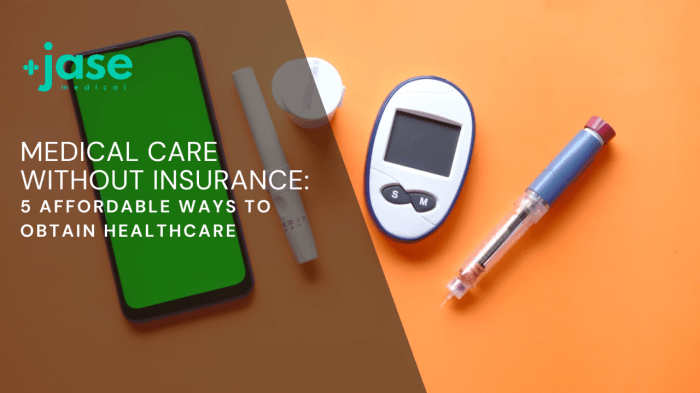Exploring the realm of affordable primary care physicians without insurance opens doors to a crucial aspect of accessible healthcare. From understanding what primary care services entail to navigating the challenges of affordability, this guide delves into the essentials of maintaining well-being without breaking the bank.
Overview of Affordable Primary Care Physician Without Insurance

Primary care physician services typically include essential healthcare services such as preventive care, treatment of common illnesses and injuries, management of chronic conditions, and referrals to specialists when needed.
One of the main challenges of finding affordable primary care without insurance is the high cost associated with office visits, diagnostic tests, and medications. Without insurance coverage, individuals may have to pay out-of-pocket for these services, which can be financially burdensome.
Primary care is crucial for overall health and well-being as it focuses on preventive care, early detection of health issues, and ongoing management of chronic conditions. Regular visits to a primary care physician can help individuals maintain good health, manage existing health conditions, and prevent serious complications.
Options for Affordable Primary Care Without Insurance
When it comes to accessing primary care without insurance, there are several options available that can help individuals receive the healthcare they need without breaking the bank.
Community Health Centers
Community health centers are a cost-effective option for primary care, offering services to individuals regardless of their ability to pay. These centers are typically funded by the government and provide a wide range of healthcare services, including preventive care, chronic disease management, and acute care.
Direct Primary Care Practices
Direct primary care practices operate on a membership-based model, where patients pay a monthly or annual fee for unlimited access to primary care services. By cutting out the middleman (insurance companies), these practices are able to offer more affordable and transparent pricing to patients.
Sliding Scale Fees
Sliding scale fees are based on a patient's income and ability to pay, allowing individuals to receive healthcare services at a reduced cost. This approach helps make healthcare more accessible to those who may not have insurance or have limited financial resources, ensuring that everyone can receive the care they need.
Tips for Finding Affordable Primary Care Physicians

Finding an affordable primary care physician without insurance can be challenging, but with the right strategies, it is possible to access quality healthcare at reasonable costs. Here are some tips to help you navigate this process:
Researching and Comparing Primary Care Providers’ Fees
- Start by researching primary care providers in your area and compiling a list of potential options.
- Reach out to these providers to inquire about their fees for basic services such as office visits, lab work, and vaccinations.
- Ask about any discounts or payment plans they may offer for patients without insurance.
- Compare the fees and services offered by different providers to find the best value for your healthcare needs.
Benefits of Establishing a Long-Term Relationship with a Primary Care Physician
- Having a long-term relationship with a primary care physician can lead to better continuity of care and more personalized treatment.
- Your primary care physician will get to know your medical history, preferences, and concerns, which can result in more effective and efficient healthcare.
- Regular check-ups and preventive care can help identify health issues early on, saving you money in the long run by preventing more serious health problems.
Negotiating Fees or Payment Plans with Healthcare Providers
- If you are facing financial difficulties, do not be afraid to discuss your situation with your primary care physician.
- Some healthcare providers may be willing to negotiate fees or offer payment plans to accommodate your budget constraints.
- Be honest about your financial limitations and explore all possible options for making healthcare more affordable for you.
- Remember that open communication and transparency can go a long way in finding a mutually beneficial solution for both you and your healthcare provider.
Importance of Preventive Care in Affordable Healthcare

Preventive care plays a crucial role in affordable healthcare by focusing on early detection and prevention of health issues, ultimately reducing overall healthcare costs.
Regular Check-ups and Screenings
Regular check-ups and screenings are essential in maintaining good health and catching any potential issues early on. By identifying and addressing health concerns in their initial stages, individuals can prevent the development of chronic conditions that may require expensive treatments.
- Annual physical exams can help monitor overall health and detect any abnormalities.
- Screenings such as blood pressure checks, cholesterol tests, and mammograms can identify risk factors for heart disease, diabetes, and certain types of cancer.
- Vaccinations and immunizations can prevent infectious diseases and their complications.
Preventive Care Measures for Individuals
Individuals can take proactive steps to maintain their health and prevent future health issues through various preventive care measures.
- Leading a healthy lifestyle with regular exercise and a balanced diet can reduce the risk of obesity, heart disease, and other chronic conditions.
- Avoiding tobacco and excessive alcohol consumption can lower the chances of developing respiratory problems, cancer, and liver disease.
- Managing stress through relaxation techniques and seeking support can improve mental health and prevent related conditions like anxiety and depression.
Closure
In conclusion, prioritizing affordable primary care without insurance is not just a financial decision but a crucial step towards ensuring long-term health and vitality. By exploring various options and strategies Artikeld in this guide, individuals can proactively manage their well-being without compromising on quality care.
FAQs
How can I find affordable primary care physicians without insurance?
Research community health centers, consider direct primary care practices, and inquire about sliding scale fees for accessible healthcare options.
Why is establishing a long-term relationship with a primary care physician important?
Building a rapport with a primary care physician allows for personalized care, better health management, and timely interventions for any health concerns.
What preventive care measures can individuals take to maintain their health?
Engage in regular check-ups, screenings, vaccinations, healthy lifestyle choices, and disease prevention strategies to proactively safeguard your well-being.












